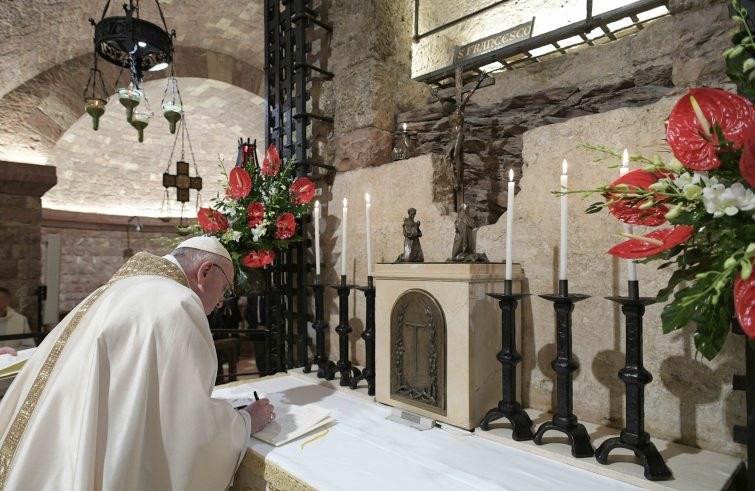
“We can aspire to a world that provides land, housing and work for all. This is the true path of peace, not the senseless and myopic strategy of sowing fear and mistrust in the face of outside threats”, the Pope writes in his third encyclical “All Brothers” signed yesterday in Assisi and released today. For Francis, “social justice” is the way to envisage “a new humanity”, based on the solidarity and subsidiarity principle to overcome global “inequity”, already denounced in Laudato sì. “If we have to begin anew, it must always be from the least of our brothers and sisters”, is the Pope’s recipe for the post.-Covid world. Human fraternity is the cure, the reference text is the Abu Dhabi document and the role model is the Good Samaritan, who bears “the pain of other people’s troubles rather than fomenting greater hatred and resentment.”
The Covid-19 pandemic erupted unexpectedly, “exposing our false securities” and our “inability to work together”,
Francis denounces in the wake of his magisterium during the pandemic: “If only this may prove not to be just another tragedy of history from which we learned nothing”, the appeal for the post-Covid world: “If only we might keep in mind all those elderly persons who died for lack of respirators. If only this immense sorrow may not prove useless, but enable us to take a step forward towards a new style of life. If only we might rediscover once for all that we need one another.” “We are more alone than ever”, the underlying acknowledgement.
Racism “which retreats underground only to keep reemerging”; the “obsession with reducing labour costs with no concern for its grave consequences”, notably the expansion of poverty.
These are but some of the consequences of the “throwaway culture”, once again condemned by the Pope, of which women – and children – in particular are the victims, “deprived of freedom and forced to live in conditions akin to slavery.”
“Digital connectivity is not enough to build bridges. It is not capable of uniting humanity”,
is the Pope’s reprimand to the realm of digital communication, marked by “remarkable hostility, insults, abuse, defamation and verbal violence destructive of others.” The closed circuits of digital platforms, ends up favouring encounter between persons who think alike, “facilitate the spread of fake news and false information, fomenting prejudice and hate.”
It is necessary “to develop a form of global governance with regard to movements of migration”,
is the proposal called for in the fourth chapter, devoted entirely to migrant persons, whose response can be summarized in four words “welcome, protect, promote and integrate”, Francis points out. “Full citizenship” and “to reject the discriminatory use of the term minorities” is crucial for those who are not recent arrivals and already participate in the fabric of society. “The true worth of the different countries of our world is measured by their ability to think not simply as a country but also as part of the larger human family. This is seen especially in times of crisis”, Francis reiterates the rejection of “narrow forms of nationalism”, immigrants are not “usurpers.”
Standing by “the people”, to interpret their feelings and cultural dynamics has nothing to do with “populism.”
In the fifth chapter, which focuses on politics, the Pope condemns “unhealthy populism”, which is when “individuals are able to exploit politically a people’s culture, under whatever ideological banner, for their own personal advantage or continuing grip on power.” It is therefore imperative to reject “irresponsible populism”, and avoid that “those who defend the rights of the most vulnerable members of society” are criticized “as populists.”
“Politics is something more noble than posturing, marketing and media spin”,
Francis writes, depicting the identikit of a “good politician” whose “biggest concern should not be about a drop in the polls”: “When a specific policy sows hatred and fear towards other nations in the name of its own country’s welfare, there is need to be concerned, to react in time and immediately to correct the course.”
“The marketplace, by itself, cannot resolve every problem”,
is Francis’ exhortation, inviting to pay heed to popular movements and to reform the UN to prevent is from being delegitimized.
“We need to learn how to unmask the various ways that the truth is manipulated, distorted and concealed in public and private discourse,” Francis points out: “What we call ‘truth’ is not only the reporting of facts and events, such as we find in the daily papers”, nor is it “mere consensus between different nations, itself equally open to manipulation.” “The heartless individualism into which we have fallen” today, Francis argues, is aggravated by the risk “that some or other alleged truth will be imposed by the powerful or the clever.” Yet,
“when it is a matter of the moral norms prohibiting intrinsic evil, there are no privileges or exceptions for anyone. It makes no difference whether one is the master of the world or the ‘poorest of the poor’ on the face of the earth. Before the demands of morality we are all absolutely equal.”
“The Shoah must not be forgotten.” “Never again war!”, never again bombs on Hiroshima and Nagasaki, “no” to capital punishment. The Holy Father reiterates this affirmation in the final paragraphs of the encyclical, highlighting the importance of enduring memory and of forgiveness. Francis quotes from a song by Vinicius de Moraes to exemplify his understanding of society as a “many-faceted polyhedron”, and exhort to carry out acts of kindness: “Life, for all its confrontations, is the art of encounter.” Following in the footsteps of Saint Francis, each one of us must rediscover the ability and the beauty of addressing one another as “brother” and “sister.” For no one is saved alone: “We are all in the same boat”, as the 266th Successor of Peter said past March 27, in an empty and rainy St.Peter’s Square.











